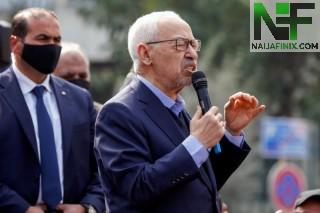As he was driven to an urgently scheduled national security meeting with the president, Tunisian Prime Minister Hichem Mechichi was unable to reach the phones of senior officers to discuss the coming conversation.

Only when he arrived at the presidential palace in Carthage did Mechichi learn the truth: President Kais Saied was invoking emergency powers to dismiss him, freeze parliament and claim executive authority. The officers he had tried to reach were already there.
His moves, labelled a coup by opponents, have left Tunisians and foreign states wondering about the future of the country whose 2011 revolution inspired the Arab Spring and then followed a democratic path unmatched by its peers.
“This is the first time in a long time that I don’t see things moving in a positive direction,” said Safwan al-Misri of Columbia University and the author of a book on Tunisia.
Interviews with Tunisian officials and others close to major players in the crisis show how feuding over the political system culminated in Saied’s intervention.
The crisis was set in train by a 2019 election in which voters rejected the establishment by choosing Saied, an anti-corruption independent, and returning a deeply fragmented parliament.
Saied feuded with Mechichi and Parliament Speaker Rached Ghannouchi. As their quarrel encompassed control of the security forces – the moment, one political source said, that the president realised he had to act.
“Saied was sure the army would stand with him,” said a source close to the president.
Saied has provided no clear roadmap but he is widely expected to enshrine a presidential system in a new constitution, ending years of tussling between rival branches of state.
However, except for taking over security institutions and other key ministries, Saied did not appear well prepared, said political scientist Mohammed Dhia-Hammami.
“He is a strongman in a weak position,” he said.
FEUD
As the 2019 election approached after years of economic stagnation, established players such as Ghannouchi’s moderate Islamist Ennahda party were unpopular.
The unstable government that finally emerged from it collapsed within months and Saied nominated Mechichi as premier. They quickly fell out over Mechichi’s choice of coalition partners.
“The president told us he hated treachery. And treachery had come from those closest to him,” a senior politician close to Saied said.
Mechichi did not respond to efforts by Reuters to contact him by phone and text message.
In January, after a dispute over a reshuffle, Mechichi said he would serve as interior minister – putting himself at the centre of the security apparatus. It meant reconciliation with the president was impossible, two sources close to Saied said, and the pair did not meet for two months.
In April, Saied said Interior Ministry forces belonged under his authority. Mechichi responded by appointing an Ennahda ally to head intelligence.
At a meeting with two political parties, Saied said it showed “Mechichi was there only to serve the interests of his allies”, one of those present said.
“It seems that Saied then decided to remove Mechichi and bring down his government,” the source said.
PROTESTS
Meanwhile the coronavirus pandemic was worsening and the government response faltered. Both Mechichi and Ghannouchi, who is 80, fell sick.
On Sunday July 25, Ghannouchi’s first day at work after two weeks of illness, protests in several cities involved attacks on Ennahda offices – violence Saied later cited in declaring emergency powers.
The president called Ghannouchi at about 5 p.m., a source close to the Ennahda leader said. The constitution required consultation with the parliament speaker and prime minister.
Saied said he did this. But Ennahda sources said he merely told Ghannouchi he would roll over a state of emergency in place since 2015.
Mechichi was at his office. He had met Saied the previous day to discuss the pandemic and was surprised to receive a call at 7 p.m. summoning him to the palace. “He went off in a hurry without knowing any details,” said an aide.
Told he had been dismissed, Mechichi could only accept, the source close to him said, and after the announcement he was driven home by a security detail.
Saied’s announcement surprised Ghannouchi too. Reached by Reuters shortly afterwards, he denounced it as a coup.
Ghannouchi had already spoken with Mechichi about the protests. After Saied’s declaration, he tried to call him again but could not reach him until 11 p.m.
He asked Mechichi if he still regarded himself as prime minister and asked him to publicly reject Saied’s moves, but the ousted premier gave no clear response, an Ennahda source said.
Already, the streets were filling with the president’s supporters, jubilant that he seemed to be cracking down on systemic disarray and stagnation.
Over the next hours, Saied assigned an ally to supervise the interior ministry while the army surrounded the Tunis parliament, television station and the Government Office.
Saied had outmanoeuvred his opponents.
Reuters


Share your thoughts